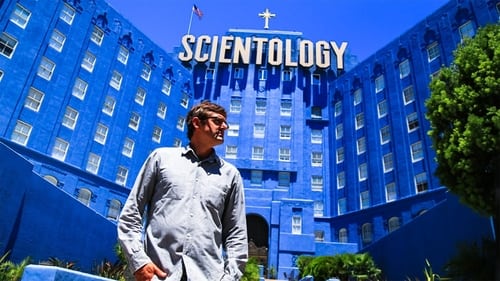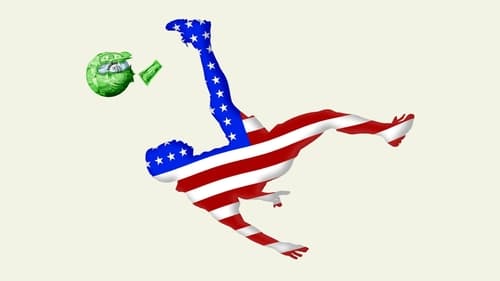
Writer
O indicado ao Emmy® John Dower dirige este documentário sobre o único sequestro de avião não resolvido na história dos Estados Unidos.

Director
O indicado ao Emmy® John Dower dirige este documentário sobre o único sequestro de avião não resolvido na história dos Estados Unidos.

Director
Um documentário de Louis Theroux que explora o que acontece nos bastidores da famosa Igreja da Cientologia.

Writer
Um documentário de Louis Theroux que explora o que acontece nos bastidores da famosa Igreja da Cientologia.

Writer
Antes de Lance Armstrong, havia Greg LeMond, que agora é o primeiro e único americano a ganhar o Tour de France. Neste filme envolvente, LeMond relembra o decisivo Tour de 1986 e sua rivalidade crescentemente feroz com o amigo, companheiro de equipe e mentor Bernard Hinault.

Director
Antes de Lance Armstrong, havia Greg LeMond, que agora é o primeiro e único americano a ganhar o Tour de France. Neste filme envolvente, LeMond relembra o decisivo Tour de 1986 e sua rivalidade crescentemente feroz com o amigo, companheiro de equipe e mentor Bernard Hinault.

Producer
One man - Joe Maggard, one supersized pair of big red magic shoes. Over 99 billion served. Superhero Ronald McDonald leaps into action at a moments notice and fights Childhood Obesity.

Director
One man - Joe Maggard, one supersized pair of big red magic shoes. Over 99 billion served. Superhero Ronald McDonald leaps into action at a moments notice and fights Childhood Obesity.

Director
On October 1, 1975, World Heavyweight Boxing Champion Muhammad Ali was in the ring with his arch rival Joe Frazier for the third time. This fight in the Philippines, which has been nicknamed "Thrilla in Manila," is considered one of the most dramatic boxing matches in history - in the words of the voice-over, "They hated each other." With the help of archive material and eyewitness accounts (including Imelda Marcos), this documentary not only reconstructs the match, but shows us what was happening behind the scenes as well.

Writer
The week before Kurt Cobain was found dead from a single gunshot, he went missing. His whereabouts for that week has remained a mystery until now. But for the first time, the story of what happened to him can now be told, using the testimony of people who knew him, the witnesses who saw him in that last week and the ordinary people who found themselves written into his story that as one puts it, 'would have been a keystone cops comedy were it not to have ended in such tragedy.

Director
The week before Kurt Cobain was found dead from a single gunshot, he went missing. His whereabouts for that week has remained a mystery until now. But for the first time, the story of what happened to him can now be told, using the testimony of people who knew him, the witnesses who saw him in that last week and the ordinary people who found themselves written into his story that as one puts it, 'would have been a keystone cops comedy were it not to have ended in such tragedy.

Director
A documentary about the killing spree of Brenda Spencer, the 16-year-old schoolgirl who opened fire on a school playground in January 1979, killing two men and injuring eight children. Her only explanation of her actions was "I don't like Mondays". This incident was the first ever school shooting of its kind, and inspired the Boomtown Rats' number one hit song I Don't Like Mondays

Screenplay
In the 1970s the North American Soccer League marked the first attempt to introduce soccer to American sports fans. While most teams had only limited success at best, one managed to break through to genuine mainstream popularity - the New York Cosmos. The brainchild of Steve Ross (Major executive at Warner Communications) and the Ertegun brothers (Founders of Atlantic Records), the Cosmos got off to a rocky start in 1971, but things changed in 1975 when the world's most celebrated soccer star, the Brazilian champion Pele, signed with the Cosmos for a five-million-dollar payday. With the arrival of Pele, the Cosmos became a hit and the players became the toast of the town, earning their own private table at Studio 54. A number of other international soccer stars were soon lured to the Cosmos, including Franz Beckenbauer, Rodney Marsh, and Carlos Alberto, but with the turn of the decade, the team began losing favor with fans and folded in 1985.

Director
In the 1970s the North American Soccer League marked the first attempt to introduce soccer to American sports fans. While most teams had only limited success at best, one managed to break through to genuine mainstream popularity - the New York Cosmos. The brainchild of Steve Ross (Major executive at Warner Communications) and the Ertegun brothers (Founders of Atlantic Records), the Cosmos got off to a rocky start in 1971, but things changed in 1975 when the world's most celebrated soccer star, the Brazilian champion Pele, signed with the Cosmos for a five-million-dollar payday. With the arrival of Pele, the Cosmos became a hit and the players became the toast of the town, earning their own private table at Studio 54. A number of other international soccer stars were soon lured to the Cosmos, including Franz Beckenbauer, Rodney Marsh, and Carlos Alberto, but with the turn of the decade, the team began losing favor with fans and folded in 1985.

Writer
In the mid-1990s, spurred on by both the sudden world-domination of bands such as Oasis and Prime Minister Tony Blair's "Cool Brittania" campaign, British culture experienced a brief and powerful boost that made it appear as if Anglophilia was everywhere--at least if you believed the press. Pop music was the beating heart of this idea, and suddenly, "Britpop" was a movement. Oasis, their would-be rivals Blur, Pulp, The Verve, and many more bands rode this wave to international chart success. But was Britpop a real phenomenon, or just a marketing ploy? This smart and often hilarious documentary probes the question with copious interviews from Noel and Liam Gallagher of Oasis, Pulp's Jarvis Cocker, Damon Albarn of Blur, Sleeper's Louise Wener, and many other artists and critics who suddenly found themselves at the cultural forefront.

Director
In the mid-1990s, spurred on by both the sudden world-domination of bands such as Oasis and Prime Minister Tony Blair's "Cool Brittania" campaign, British culture experienced a brief and powerful boost that made it appear as if Anglophilia was everywhere--at least if you believed the press. Pop music was the beating heart of this idea, and suddenly, "Britpop" was a movement. Oasis, their would-be rivals Blur, Pulp, The Verve, and many more bands rode this wave to international chart success. But was Britpop a real phenomenon, or just a marketing ploy? This smart and often hilarious documentary probes the question with copious interviews from Noel and Liam Gallagher of Oasis, Pulp's Jarvis Cocker, Damon Albarn of Blur, Sleeper's Louise Wener, and many other artists and critics who suddenly found themselves at the cultural forefront.















